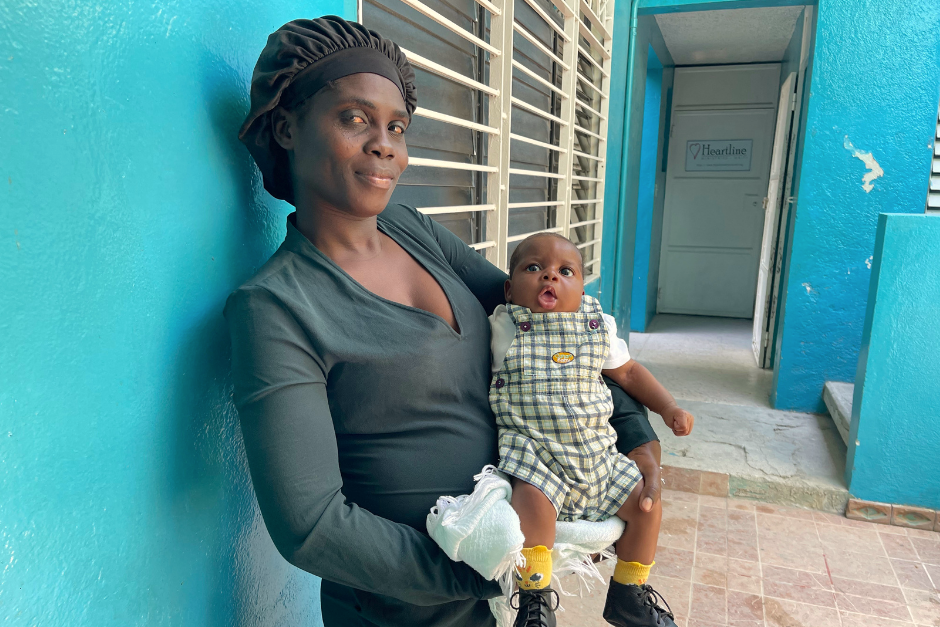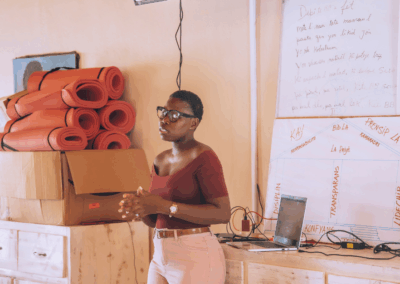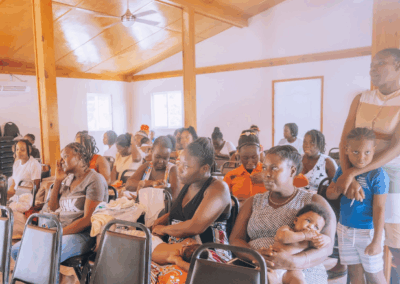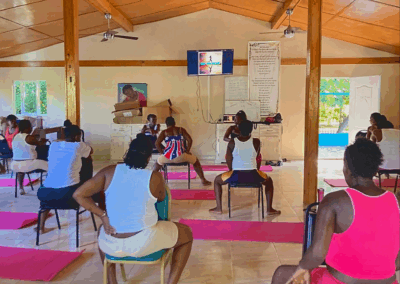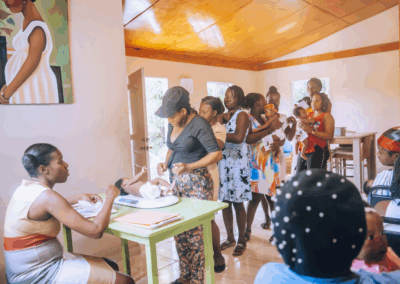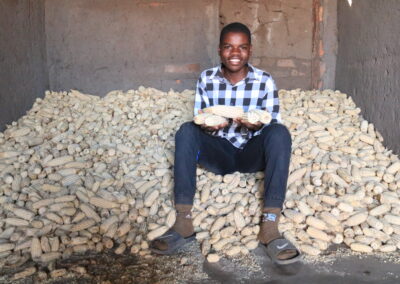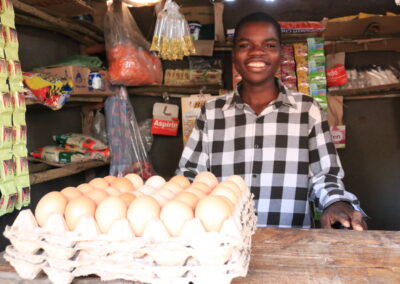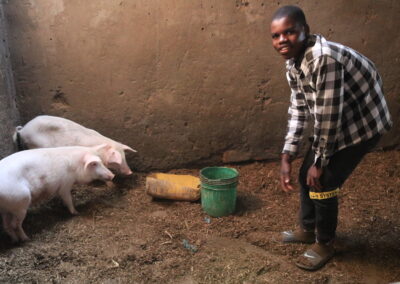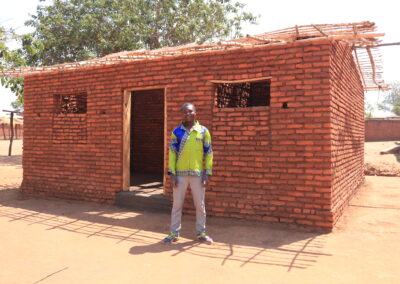ODW + HEARTLINE HAITI
Project #327 | Compassionate Maternal & Infant Healthcare in Haiti
Our Partnership with Heartline Haiti
In Haiti, one of the poorest nations in the world, quality healthcare is practically nonexistent. For women giving birth, the risks are high: Haitian women face a 1 in 94 chance of dying from complications during pregnancy or childbirth – compare that to 1 in 2,700 in the United States. Recent sociopolitical turmoil has only made it more difficult for mothers to receive the care that they need, especially in urban hubs like Port-au-Prince.
One Day’s Wages partnered for a second year with Heartline Haiti to support high-quality medical care and health education in Port-au-Prince. At the Heartline Maternity Center, women received weekly prenatal check-ups, delivery care, postpartum and early childhood development classes, coaching on nutrition and breastfeeding, homemade meals and a vitamin regimen. Despite operating in an area where there are constant threats of violence, this year the Center was able to serve over 1,000 mothers and safely deliver 77 precious newborns!
Our Collective Impact
WOMEN RECEIVED PRE- AND POST-NATAL MEDICAL CARE
NEWBORNS SAFELY DELIVERED AT MATERNITY CENTER
COMMUNITY MEMBERS ATTENDED WEEKLY CLINICS
Meet Rosenie
Story written by Haitian journalist, Aljany Narcius
At thirty-five, Rosenie is one of the older moms at the Heartline Maternity Center today. The baby boy she carries with her is her third child, and she is old enough to be many things some of the other mothers are not.
Most of all, she is old enough to remember.
She was 22 for the terrible earthquake of 2010 and the destruction and death that followed, which means she remembers the days before, when the National Palace stood strong at the heart of the city, when the mass graves had not been dug, when cholera had not yet struck.
She remembers elections – she was old enough to vote in many of them. There hasn’t been a national election in Haiti since 2016.
She remembers raising children in a country that might have been poor, might have been wracked by storms and earthquakes, but mercifully was not at war. Now, she will raise her youngest in a country without a palace, without democracy, a country mired in a brutal
gang war that neither side will ever really win.
For years, she was a street vendor, in the tradition of the Madan Sara. Her husband worked at the Société Nationale des Parcs Industriels, an industrial park that was home to several manufacturers and their staff. Like so many Haitians, the gang war and its economic fallout took their livelihoods away. For Rosenie, the unpredictable violence destroyed her business. No street market survives a gunfight. Her husband was laid off as the market for Haitian manufacturing crumbled.
As we speak, I lose her gaze. “Everything I had, everything I had built through sacrifice, was destroyed in an instant,” she says.
Today, they live in a shack in Cite Soleil, Haiti’s largest and most infamous slum. The rent is 7,500 gourdes, around $50 USD, and that keeps them there.
“Even if it’s a shack, it’s all we have,” Rosenie sighs, resigned. She pays for her older children to go to school, but at times, they go on empty stomachs, without a lunchbox. “It breaks a mother’s heart to see her children leave without eating,” she confesses, tears in her eyes.
It is in this context that Rosenie delivers her third child. Pregnancy in Haiti is dangerous: maternal complications are a top-10 cause of death for Haitian women, and maternal mortality rates mirror war-torn nations like Rwanda, Sudan, and Afghanistan.
But she’s found her way to the Heartline Maternity Center, where the maternal mortality rate is zero. There, Rosenie attended prenatal Thursdays, where she found herself in a cohort of other mothers – not alone, but in community. The MC staff tended to her and her unborn son with care. She was fed nutritious meals each time she visited, she took classes on infant care, and when it came time for delivery, she had a safe place to go.
Still, it was not easy, and what should have been a moment of joy turned into a fearful ordeal. The delivery was complicated due to the baby’s position; progress was slow and difficult.
“I thought I was going to die,” Rosenie recounts, her voice trembling. She’s right. Normally, this is the kind of thing that kills Haitian moms.
She spent four days at the Maternity Center, at one point suffering severe hemorrhaging, but the Heartline midwives quickly took charge and stabilized her – and Haiti did not lose yet another of its precious mothers. “I was taken care of from beginning to end, never abandoned,” she says.
Rosenie and her family are like thousands of other Haitians. They were born into a complicated, beautiful, difficult country, adapted to its ways of life, and learned how to build stability and structure within it. Then, over the course of a few short years, even the scraps of normality are torn from their hands. They were tasked with finding a path through poverty, and now they are tasked to find a path through war as well.
Still, Rosenie does not lose faith. She is not resigned to circumstance. “As long as we are alive, there is hope. But for how much longer?” she wonders. Despite the uncertainty of the
future, she feels immense happiness as she holds her baby close. This fragile little being gives her the strength to keep going, to fight every day to offer him a better life, a better tomorrow, committed to the unrelenting struggle of a Haitian mother.
It is no longer a struggle Rosenie faces alone. With her little one in her arms, she’ll regularly return to the Maternity Center for postpartum classes and check-ups, and the two of them will get the care and support they need through meals, medicine, and education.
Rosenie expresses deep gratitude for the Heartline Maternity Center team. “Without them, I don’t know what I would have done. They provide not only medical care – but also hope – to women like me.”
Thank you for making this possible!
Our movement is grassroots. The projects we support are led by local leaders, and all the funds we raise are through ordinary donors who give a day of their wages to support those experiencing extreme poverty. Will you consider giving $25, $100 or $250 to make our partnerships possible?
LEARN
Leadership
Transparency
Read the Latest
Contact Us
COLLABORATE
Faith Groups
Schools
Businesses
Get Involved
One Day’s Wages exists to alleviate extreme poverty by investing in, amplifying, and coming alongside locally led organizations in underserved communities.
©2026 One Day's Wages is a registered 501(c)(3) organization | Tax ID #26-2566653 | Privacy policy | Terms of use
P.O. BOX 17575 Seattle, WA 98127 | Contact us

